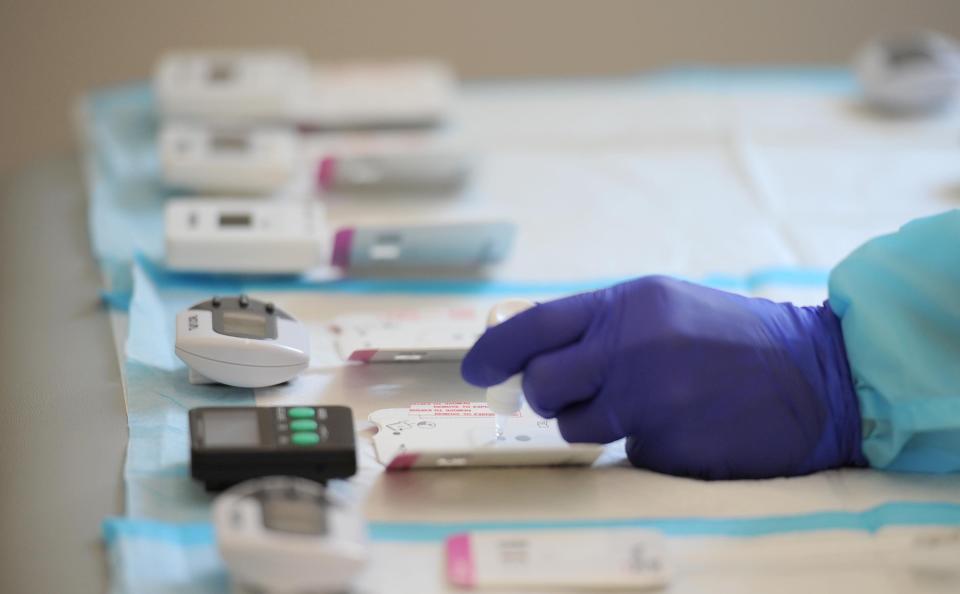Why is COVID-19 surging again? From new variants to boosters, what to know on Cape Cod
- Oops!Something went wrong.Please try again later.
The Centers for Disease Control’s latest U.S. COVID-19 data, posted on Aug. 19, showed a continued upward trend in hospitalizations — an 18.8% rise from July 30-Aug. 5, the most recent period for which data was available.
Deaths, too, were up — 21.4% from Aug. 6-12 nationwide.
For the state of Massachusetts, as of August 12, the weekly new hospital admissions for COVID-19 was 327 and the weekly deaths stood at 19, a slight increase from previous weeks, according to the CDC.
Also according to the CDC, the community risk level in Barnstable, Dukes and Nantucket counties is low. The risk level helps convey how much COVID-19 is affecting a community using data on hospitalizations and cases.

COVID-19 hospitalizations on Cape Cod and Islands
Closer to home, in the Aug. 17th CDC weekly report, Barnstable County posted 186 new COVID-19 hospital admissions, with a 40.9% change in hospital admissions from the prior week.
According to Claire Seguin, Chief Nurse and Vice President of Operations at Martha’s Vineyard Hospital, during July, the Emergency Department treated 33 people with COVID-19 and this month, as of Monday, Aug. 14, the late data available there were 43 patients with COVID-19.
Of those, the hospital currently has three patients hospitalized with COVID-19. Two of them are in fair condition and one is listed in serious condition in the intensive care unit.
As of Wednesday, Cape Cod Healthcare has between 15 and 20 patients in hospitals who have tested positive for COVID-19. According to William Agel, MD, MPH, Chief Medical Officer for Cape Cod Healthcare, which operates Cape Cod and Falmouth hospitals, most of these patients do not have symptoms of COVID-19 and were admitted for other medical reasons.
Why is COVID-19 surging again?
According to Agel, all the current circulating strains are subvariants of omicron, and at this time, there is not one dominant sub-variant.
"The current uptick in cases is probably secondary to a combination of factors, including waning immunity after a period of lower viral activity in the spring and early summer and time since vaccination, changing social behaviors relevant to the virus and possibly some degree of immune escape by new sub-variants," said Agel.
Is the latest omicron variant dangerous?
The EG.5 coronavirus is a new subvariant and descendant of omicron — which remains the world’s most prevalent coronavirus strain today.
EG.5 now accounts for the largest proportion of COVID-19 cases nationwide, with an estimated 20% of cases, according to the CDC.
In its latest update, the World Health Organization categorized EG.5 as a variant of interest that countries should monitor. The organization also said it poses a low risk to public health in comparison with other omicron descendants because there is no evidence it is causing more severe disease.
"We have seen a modest increase in COVID cases, but not a concomitant increase in severe disease," Agel said.
According to Wendy Judd, a public health nurse at the Barnstable County Health Department, the new mutation is not any stronger and it is not causing any more severe illness or symptoms or hospitalization, as of now.
How long does it take to recover from the new COVID-19 variant?
"The recovery time depends on individuals, we do have a lot of people in our region that are up to date with the current vaccination, so even if they're getting COVID they're less sick," said Judd.
According to Judd, the practices of wearing a mask and using good hygiene, proper hand washing and staying away from others who might be immunocompromised are still effective recommendations.
What are the symptoms?
Like other omicron strains, EG.5 tends to infect the upper respiratory tract, causing a runny nose, sore throat and other cold-like symptoms, as opposed to lower respiratory tract symptoms. But people 65 or older or who have a weak immune system are at higher risk of the virus traveling to the lower respiratory tract, causing severe illness.
When will new COVID-19 boosters be available?
A new booster shot is expected this fall.
The booster won’t be an exact match for EG.5, though Pfizer, Moderna, and Novavax are all developing versions aimed at omicron offshoot XBB 1.5, a close relative.
In August, Moderna announced that early clinical trials show that its booster shot will effectively target the EG.5 variant.
"We are waiting for the new vaccine to come out and when it does, we will be offering COVID clinics here at Barnstable County as soon as it is available," said Judd.
She also recommends that people stay up to date with their flu vaccine.
Rasheek Tabassum Mujib writes about health care and education. Reach her at rmujib@capecodonline.com.
Thanks to our subscribers, who help make this coverage possible. If you are not a subscriber, please consider supporting quality local journalism with a Cape Cod Times subscription. Here are our subscription plans.
This article originally appeared on Cape Cod Times: Cape Cod COVID-19 news: New variant symptoms, boosters, recovery time

